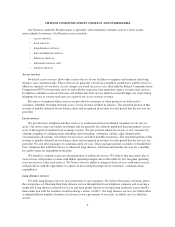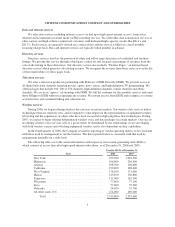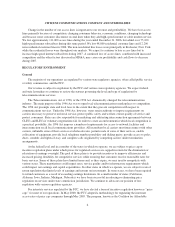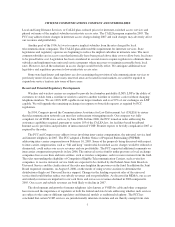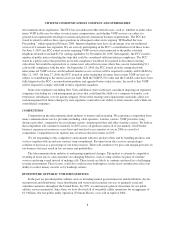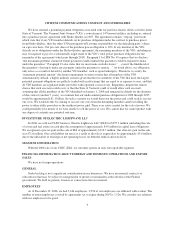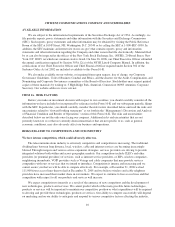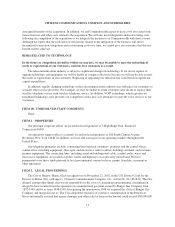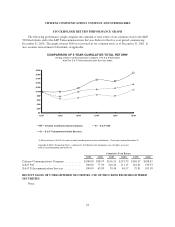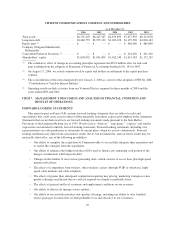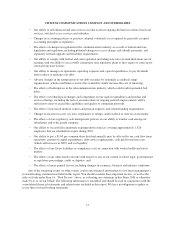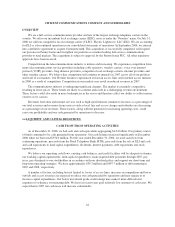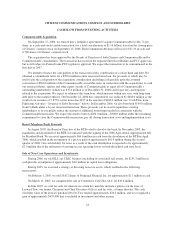Frontier Communications 2006 Annual Report Download - page 15
Download and view the complete annual report
Please find page 15 of the 2006 Frontier Communications annual report below. You can navigate through the pages in the report by either clicking on the pages listed below, or by using the keyword search tool below to find specific information within the annual report.CITIZENS COMMUNICATIONS COMPANY AND SUBSIDIARIES
anticipated benefits of the acquisition. In addition, we and Commonwealth expect to incur costs associated with
transaction fees and other costs related to the acquisition. We will also incur integration and restructuring costs
following the completion of the acquisition as we integrate the businesses of Commonwealth with those of ours.
Although we expect that the realization of efficiencies related to the integration of the business will offset
incremental transaction, integration and restructuring costs over time, we cannot give any assurance that this net
benefit will be achieved.
RISKS RELATED TO TECHNOLOGY
In the future as competition intensifies within our markets, we may be unable to meet the technological
needs or expectations of our customers, and may lose customers as a result.
The telecommunications industry is subject to significant changes in technology. If we do not replace or
upgrade technology and equipment, we will be unable to compete effectively because we will not be able to meet
the needs or expectations of our customers. Replacing or upgrading our infrastructure could result in significant
capital expenditures.
In addition, rapidly changing technology in the telecommunications industry may influence our customers to
consider other service providers. For example, we may be unable to retain customers who decide to replace their
wireline telephone service with wireless telephone service. In addition, VOIP technology, which operates on
broadband technology, now provides our competitors with a low-cost alternative to provide voice services to our
customers.
ITEM 1B. UNRESOLVED STAFF COMMENTS
None.
ITEM 2. PROPERTIES
Our principal corporate offices are located in leased premises at 3 High Ridge Park, Stamford,
Connecticut 06905.
An operations support office is currently located in leased premises at 180 South Clinton Avenue,
Rochester, New York 14646. In addition, we lease and own space in our operating markets throughout the
United States.
Our telephone properties include: connecting lines between customers’ premises and the central offices;
central office switching equipment; fiber-optic and microwave radio facilities; buildings and land; and customer
premise equipment. The connecting lines, including aerial and underground cable, conduit, poles, wires and
microwave equipment, are located on public streets and highways or on privately owned land. We have
permission to use these lands pursuant to local governmental consent or lease, permit, franchise, easement or
other agreement.
ITEM 3. LEGAL PROCEEDINGS
The City of Bangor, Maine, filed suit against us on November 22, 2002, in the U.S. District Court for the
District of Maine (City of Bangor v. Citizens Communications Company, Civ. Action No. 02-183-B-S). The City
alleged, among other things, that we are responsible for the costs of cleaning up environmental contamination
alleged to have resulted from the operation of a manufactured gas plant owned by Bangor Gas Company from
1852-1948 and by us from 1948-1963. In acquiring the operation in 1948 we acquired the stock of Bangor Gas
Company and merged it into us. The City alleged the existence of extensive contamination of the Penobscot
River and initially asserted that money damages and other relief at issue in the lawsuit could exceed $50,000,000.
14


